Intercultural Conversations, a program developed last fall at the University of Nebraska-Lincoln which strives to integrate international and domestic students with intentionality, won the Innovative Program Award at the 2017 Association for Orientation, Transition, and Retention in Higher Education (NODA) Region V Conference.
Through Intercultural Conversations, Student Engagement staff pair international students with domestic students who are members of fraternities and sororities, decreasing barriers and leading to a 2-hour facilitated conversation inside Greek chapter houses.
The idea for the program developed at the Big 10 Summit on Integration in spring 2016 when New Student Enrollment and Student Engagement staff learned that fraternities and sororities are seen as the primary barrier to integration between international and domestic students.
Recognizing that one program alone cannot solve the integration challenge, organizers sought to increase the number of students who interact with others different from themselves. Organizers set learning objectives that included:
- Identifying cultural differences and similarities.
- Describing how cultural influences affect behavior, relationships, campus experiences and student life.
- Identifying how intercultural sensitivity can promote positive engagement among students.
During the fall program rollout, organizers of the Intercultural Conversations program partnered with instructors of U.S. Education in the Age of Globalization (CYAF 121) so that students could participate as a part of the course.
Earlier this month a smaller version of the program replicated the three-part facilitation. The spring program took place in the Gamma Phi Beta house and began with small group discussion based on conversation topics such as participants' motivations to study and their family life. The icebreaker then progressed into a discussion on cultural differences. For example, one group learned from an international student that gesturing while having a conversation is considered to be disrespectful in China.
During the final part of the discussion, groups participated in a team building exercise in which they nominated one of their group members for a hypothetical position. Teams then wrote and presented a nomination speech to the large group explaining why the leader was culturally competent.
After small group activities, sorority members gave the international students a tour of their house and spoke about Gamma Phi Beta’s traditions, symbols and philanthropies. The students also learned about more about the Greek system in general. The sorority members explained how recruitment works, the requirements for being in a sorority, how bigs and littles create families within a sorority, and why members dress up for Monday night meetings.
The program helped international students gain a deeper understanding of the Greek system.
“[The program] is a pretty good chance to learn more about [Greek life],” said Elaine Su, a freshman from China. “I feel more comfortable to talk to them.” Voyage Yuan, a first-year transfer student from China, was interested in learning more about the requirements to join a sorority or fraternity.
“I think the GPA requirements were interesting. It’s hard to get [into],” said Yuan. “At first I thought anyone could get into a Greek house.”
Teresa Lostroh, international coordinator, said the program will continue this fall and that organizers plan to include more chapters and activities. The pilot program included 232 participants and seven Greek chapters. After the program, participants reported feeling more comfortable engaging in activities and conversations with people who were different from them; they reported having an increased understanding of how culture shapes behavior; and they reported an increased desire to participate in international engagement programs.

